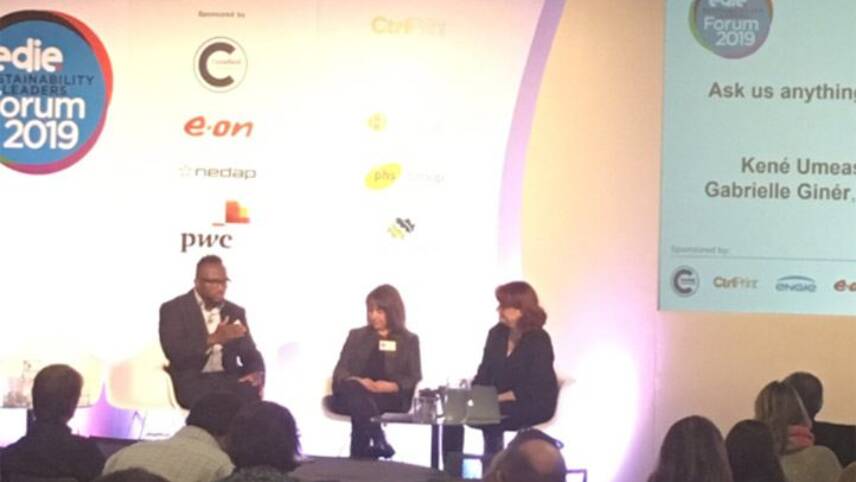Register for free and continue reading
Join our growing army of changemakers and get unlimited access to our premium content

(L-R) Tesco's head of environment Kené Umeasiegbu and BT's head of environmental sustainability Gabrielle Giner were quizzed by Futerra's Solitaire Townsend
During an immersive and engaging Q&A session during Day One of edie’s Sustainability Leaders Forum in London on Tuesday (5 February), BT’s head of environmental sustainability Gabrielle Giner and Tesco’s head of environment Kené Umeasiegbu were asked how they garnered enough internal consensus to align their sustainability strategies with the most ambitious pathway set by the Paris Agreement.
BT had been working on carbon reductions since the 1990s, but gained approval from the Science Based Targets initiative (SBTi) for its ambitions in September 2017. Giner explained that the science behind the company’s aim to reduce emissions by 87% by 2030 against a 2016/17 baseline had been a key factor in achieving boardroom buy-in.
“We used to go to the board and ask to set a carbon reduction target of 20% by 2020 or 80% by 2080 – but there was no basis, and the board knew we could make up any number,” she explained. “Now, we can say our targets correlate to the recommendations of the scientific community.”
Tesco’s Umeasiegbu agreed, adding that his team’s ability to gather board-level support in setting the company’s science-based target in May 2017 was dependent on the ambition being “credible, evidence-based and realistic”.
“The reason that the business supported the 1.5C trajectory was that we laid out a pathway to meeting it – we had to put down our sustainability and energy hats to work out how we could make it revenue-neutral or cost-neutral,” he explained.
“As we set [the targets], the key thing the board was looking for was credibility and whether we could lead the company to achieve them.”
Tesco’s current goals are to reduce its absolute carbon emissions from its operations by 35% by 2020, 60% by 2025 and 100% by 2050 against a 2015-2016 baseline. The retailer has already switched to 100% renewable-certified purchased electricity across its operations in the UK as it strives to meet these aims, and last year recorded a 13% year-on-year reduction in its total carbon footprint.
The consensus conundrum
During the 30-minute session, Giner and Umeasiegbu were also asked how much internal consensus was needed to set 1.5C targets, which have experienced very limited uptake since the Paris Agreement was ratified in 2015. Only two other firms – tea brand Pukka Herbs and brewer Carlsberg – have had such aims approved by the SBTi to date.
Both speakers emphasised the importance of achieving “practical” rather than “unanimous” levels of support, highlighting the importance of board-level engagement while arguing against slowing down the process by asking every single employee.
“You need to find the right balance between getting consensus and acting on what is right,” Tesco’s Umeasiegbu said.
“My mentor used to tell me that sometimes, you just need to apologise afterwards rather than asking permission first. Once you announce a bold goal, you’ll often find that everyone is then on your side.”
BT’s Giner took a slightly different approach to “practical” consensus, explaining that buy-in from the company’s chief executive had been “instrumental” in generating a science-based target within a short timeframe.
“For our current targets, we had to get consensus from our operating committee, but the fact that we had a supportive CEO really helped to influence the others,” she explained.
“But we also have carbon ‘champions’ across all our key business areas. These people don’t need to be at management level, they need to get things done and fast-track decisions through the business without the ‘your boss’s boss’s boss said I had to do this’ mindset.”
Both speakers additionally emphasised the changing nature of sustainability leadership within the corporate sphere, arguing that it is becoming a “two-way” dynamic between the C-suite and the sustainability, responsible procurement and energy teams.
“There wasn’t any pushback to setting our targets internally, mostly because people didn’t know what we were talking about,” Tesco’s Umeasiegbu said.
“In other words, my CEO is not an expert in this area, but he is passionate about sustainability. Many of us are looking to our company leaders for leadership when, actually, they may be looking for leadership from us as sustainability professionals.”
Looking ahead
As the session came to a close, both speakers were asked what they were doing in 2019 to take their sustainability leadership to the next level.
The question came shortly after BT announced its intent to become a carbon-neutral business by 2045, in line with the recent Intergovernmental Panel on Climate Change (IPCC) warning that there are just 12 years left to keep global warming increases to a maximum of 1.5C.
However, Giner cited consumer engagement as her main area of focus for 2019, as the company strives to meet its flagship 3:1 ambition of helping customers cut carbon emissions by three times their own end-to-end emissions by 2020. Progress currently sits at a ratio of 2.2:1, up from 1.8:1 in 2017.
As for Tesco, Umeasiegbu highlighted the retailer’s recent commitment to halve the environmental impact of the average UK shopping basket. Over the coming year, the retailer will work with WWF to create a “pioneering” industry measure of the environmental impact of the average UK shopping basket, based on foods and ingredients.
Sarah George


Please login or Register to leave a comment.